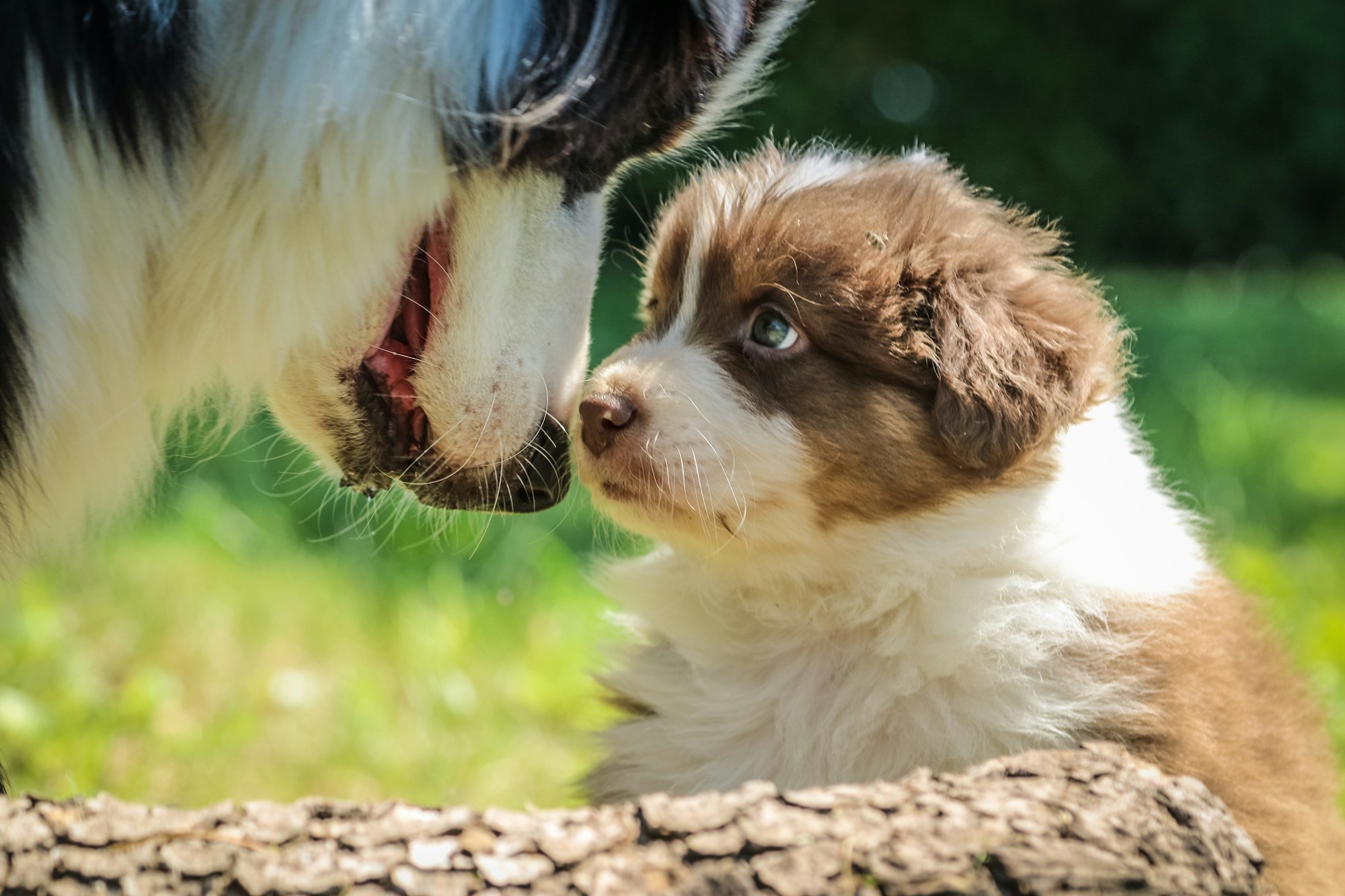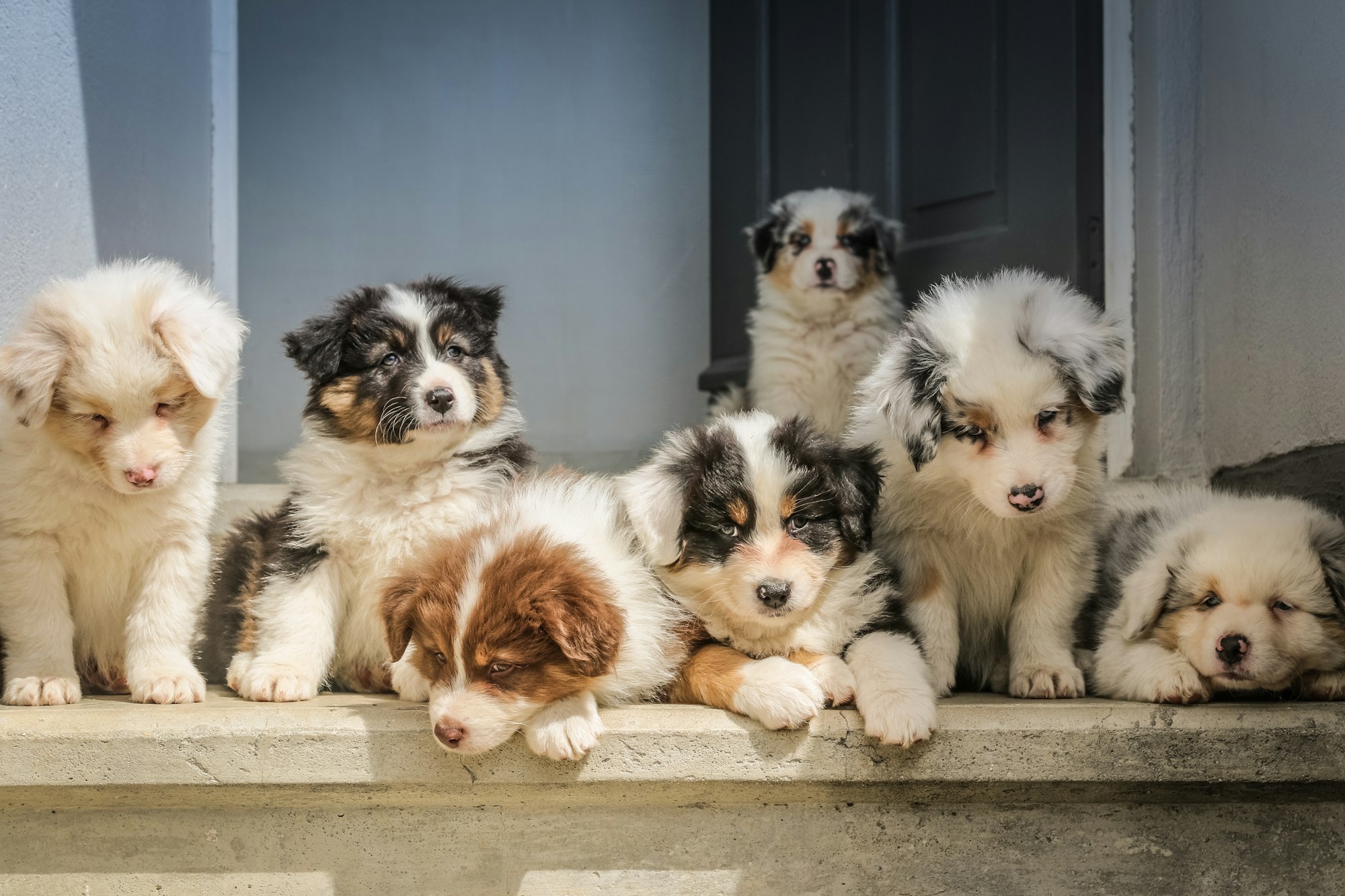Puppies are bundles of energy and curiosity, ready to explore the world around them. However, ensuring they grow into well-adjusted, sociable adults requires intentional effort in socialization. In this guide, we'll delve into the why, when, and how of socializing your furry friend.

I. Introduction
A. The Importance of Socializing Your Puppy
Socialization is a crucial aspect of a puppy's development, influencing their behavior and temperament throughout their lives. It lays the foundation for a well-rounded, adaptable adult dog.
B. What Is Puppy Socialization?
Puppy socialization involves exposing your young canine companion to various people, environments, and experiences to help them build confidence and learn positive behaviors.
II. When to Start Socializing
Alright, so you've got this adorable ball of fluff bouncing around your home, and you're wondering when the right time is to throw them into the socialization mix. Well, the clock starts ticking early!

A. The Critical Socialization Period
Picture this: your puppy is between 3 to 14 weeks old, and this timeframe is like the golden ticket for socialization. It's the critical period where their little brains are sponges soaking up everything. The experiences during these weeks leave a lasting mark on their behavior.
B. Early Experiences Shaping Behavior
Think of it as the puppy personality shaping phase. Introduce them to new people, places, and situations during this window, and you're laying the groundwork for a socially savvy dog. It's like puppy kindergarten for building their confidence and reducing the chances of fear or aggression issues later on.
III. Benefits of Puppy Socialization
Now, you might be wondering, "What’s in it for my pup?" Well, a whole lot of goodness, that's what!
A. Reduced Aggression and Fear
Nobody wants a Cujo instead of a cuddle bug. Proper socialization helps your furry friend grow into a well-mannered, balanced adult dog, steering clear of aggression and fear issues.
B. Improved Adaptability
We all know life throws curveballs. A well-socialized pup is like a four-legged life adventurer, ready to take on new environments and changes without breaking a sweat.
C. Positive Impact on Training
Training can be a breeze with a socialized pup. They're like the A+ students of the canine world, soaking up commands and behaviors faster than you can say "sit" or "stay."
IV. How to Socialize Your Puppy
Now, let’s get down to the nitty-gritty – how to turn your furball into a social butterfly.
A. Controlled Introductions
It's like a puppy blind date, but less awkward. Start small, introducing your pup to new people, pets, and environments in a controlled manner. Slow and steady wins the socialization race.
B. Exposure to Various Environments
Mix it up! Take your pup to different places – urban, rural, indoors, outdoors. This isn’t just about teaching them to navigate the concrete jungle; it's about broadening their comfort zone.
C. Positive Reinforcement Techniques
Who doesn’t love a treat? Use positive reinforcement like treats and praise to reward your puppy for being a social superstar. It’s the canine version of getting a gold star on your homework.
V. Common Socialization Challenges
Alright, so you've embarked on the grand adventure of socializing your pup, but hey, bumps in the road are just part of the journey.
A. Fearful Behavior
Imagine your pup encounters something that sends them into a tail-tucked, ears-back panic. Fear not! It happens. The key is to recognize those fear signals early and address them with patience and positive reinforcement.
B. Aggressive Tendencies
Uh-oh, the dreaded "Grrr." If your pup is showing signs of aggression, it's time to put on the behavior detective hat. Monitor their triggers, and if needed, seek professional advice. Remember, we're aiming for a loveable Fido, not a fur-covered tough guy.
C. Overcoming Setbacks
No one said this would be a walk in the park. Setbacks are normal. Your pup might have an off day or a not-so-great encounter. Be persistent, stay positive, and guide them through these hurdles. It's like teaching them to ride a bike – a few tumbles won’t stop them from cruising eventually.
VI. Socializing with Other Dogs
Now, let’s talk doggy diplomacy. Your pup's got to learn to navigate the canine social scene.

A. The Importance of Canine Interactions
Doggos, just like humans, need pals. Encourage positive doggy interactions. It’s like a furry networking event where they learn vital social skills, including the art of butt-sniffing diplomacy.
B. Monitoring Play Behavior
Playtime is crucial, but it’s not a WWE smackdown. Keep an eye on their playdates to ensure it's all tail wags and happy barks. If things get a bit too rowdy, step in like the doggy referee you are.
C. Group Socialization Activities
Time to join the puppy party! Group socialization is like sending your pup to the coolest doggy school. They get to romp around, play, and learn from their fur buddies. Just make sure it's a controlled environment – think of it as a well-chaperoned school dance.
VII. Socializing with People
Now, let’s switch gears from furry friends to two-legged companions – because your pup needs to charm the socks off everyone they meet.
A. Encouraging Positive Interactions
Human friends are important too! Teach your pup that meeting new people is like discovering a treasure trove of ear scratches and belly rubs. Allow them to approach at their own pace and shower them with praise when they nail those polite greetings.
B. Handling Different Stimuli
Life is full of surprises, and your pup needs to be ready for anything. Expose them to different stimuli – weird sounds, odd movements – so they can confidently handle life's quirks without turning into a nervous Nelly.
C. Meeting Strangers and Visitors
Strangers become friends, right? Guide your pup through the art of meeting new faces. Gradually introduce them to different folks in controlled settings, turning those strangers into treat-dispensing pals.
Socializing is like giving your pup a VIP ticket to the world – doggy and human. Embrace the challenges, celebrate the victories, and soon your furball will be the social butterfly of the block!
VIII. Socializing in Various Environments
Alright, time to take your pup on a world tour! Well, maybe not the whole world, but definitely a variety of environments.
A. Urban Settings
Think skyscrapers, bustling streets, and the hum of city life. Urban socialization is like giving your pup a crash course in city living. Navigate through the urban jungle, introducing them to honking horns, the scent of hot dog stands, and the art of crossing streets with panache.
B. Rural Environments
Now, let’s swap the cityscape for wide-open fields and fresh country air. Rural socialization is all about embracing nature – new smells, different critters, and maybe a tumble in the grass. It’s a pastoral adventure for your furry explorer.
C. Indoor and Outdoor Socialization
Balance is key. From the cozy living room to the great outdoors, your pup needs to feel at ease everywhere. Indoor socialization teaches them how to Netflix and chill, while outdoor adventures let them embrace their wild side. It’s like a double-feature movie night, but with more tail wagging.
IX. Signs of Successful Socialization
How do you know your pup is acing the socialization game? Look out for these telltale signs:
A. Positive Body Language
A relaxed tail, ears perked up, and a wiggly butt – that’s the canine version of a victory dance. Positive body language means your pup feels comfortable and confident in different situations.
B. Playful Behavior
Is your pup engaging in playdates with the finesse of a puppy parkour champion? Playful behavior indicates they're not just socializing but having a blast doing it.
C. Adaptability to New Situations
From the city to the countryside, your pup takes it all in stride. If they’re adaptable and curious in new environments, you’ve got yourself a socially savvy pup.
X. Consistency in Socialization
Consistency is the secret sauce to successful socialization. It’s not a one-time deal – it’s an ongoing adventure.
A. Incorporating Socialization into Daily Routines
Make socialization a daily ritual. Whether it's a morning stroll or a weekend outing, weave social interactions into your pup's routine. Consistency turns socialization into second nature.
B. Gradual Exposure to New Experiences
Think of it like introducing a friend to your favorite TV show – start with the pilot episode. Gradually expose your pup to new experiences, ensuring they build confidence at their own pace. It’s the slow and steady approach that wins the socialization race.
C. Lifelong Socialization Benefits
Remember, this isn’t a short-term fix. The benefits of socialization extend beyond puppyhood. Consistent efforts now mean you'll have a well-adjusted, social butterfly of a dog for years to come.
So, grab that leash, put on your adventure hat, and let the socialization journey continue. Your pup’s social passport is ready for more stamps!
XI. Socialization and Training
Now that your pup is mingling like a pro, let's talk about how socialization and puppy training go together like peanut butter and jelly.
A. Complementing Obedience Training
Think of socialization as the hands-on training ground for good behavior. It's where your pup learns that sitting calmly when meeting a new friend gets them treats and belly rubs. The best part? Socialization reinforces what you're teaching in obedience training, making it stick like glue.
B. Reinforcing Desired Behaviors
Every successful social interaction is a golden opportunity to reinforce good behavior. Did your pup politely greet another happy dog? Time for a treat party! Socialization becomes a constant loop of positive reinforcement, shaping your furry friend into a model citizen.
C. Addressing Behavior Issues Through Socialization
Got a bit of a rebel on your hands? No worries! Socialization isn’t just about making friends; it's also a tool to address and prevent behavior issues. Tackling problems head-on in a controlled environment helps your pup understand the do’s and don’ts of doggy etiquette.
XII. Socialization Mistakes to Avoid
While we're on the topic of socialization superhero training, let’s make sure we steer clear of some common pitfalls.
A. Overwhelming Experiences
Ever been to a party that felt like too much? Dogs feel the same way. Avoid overwhelming your pup with too many new experiences at once. Gradual introductions are the name of the game.
B. Forced Interactions
Imagine someone pushing you into a group photo when you're just not feeling it. Dogs don't like forced interactions either. Let your pup set the pace. If they want to sniff from a distance before diving into a playdate, respect their comfort zone.
C. Ignoring Warning Signs
Dogs communicate with more than just barks and tail wags. Pay attention to your pup's body language. If they're signaling discomfort or stress, it's time to dial it back. Ignoring warning signs is like driving with the gas pedal down when the engine is making weird noises – not a good idea.
XIII. Socialization and Health
Now, let’s dive into the health perks of having a socially adept pup.
A. The Impact on Mental Well-being
Socialization isn’t just about making your pup popular; it's a mental workout. Positive interactions and exposure to new things reduce stress, boost confidence, and contribute to a happy, healthy pup.
B. Reducing Stress and Anxiety
A well-socialized pup is like a Zen master in a fur coat. They handle new situations with ease, reducing the likelihood of stress and separation anxiety. It’s like having a built-in emotional support animal ready for any adventure.
C. Long-Term Health Benefits
Good behavior equals good health. The positive impact of socialization on your pup's behavior translates into long-term health benefits. Less stress, fewer behavior issues, and a happy, well-adjusted companion for life.
Socialization isn’t just a phase – it’s a lifestyle. It’s the secret sauce to a well-behaved, happy, and healthy furry family member. So, keep the treats handy, the positive vibes flowing, and let the socialization party continue!

XIV. Real-Life Socialization Stories
A. Personal Anecdotes of Successful Socialization
Share personal stories of overcoming socialization challenges, highlighting the positive outcomes.
B. Overcoming Challenges Through Consistent Efforts
Emphasize the importance of consistency in socialization efforts, showcasing how persistence pays off.
C. Celebrating the Joys of a Well-Socialized Puppy
Celebrate the joy of having a well-socialized puppy, enjoying the benefits of a harmonious bond between you and your furry friend.

XV. Conclusion
Socializing your puppy is a rewarding journey that significantly impacts their behavior and well-being. With patience, consistency, and positive reinforcement, you can shape a confident, adaptable, and happy adult dog. Invest the time and effort in socialization, and you'll reap the benefits of a lifelong companionship filled with joy and harmony.
Frequently Asked Questions (FAQs)
Q: When is the best time to start socializing a puppy?
- A: The critical socialization period is between 3 to 14 weeks, making early introductions essential for positive behavior development.
Q: How do I know if my puppy is successfully socialized?
- A: Look for positive body language, playful behavior, and adaptability to new situations as signs of successful socialization.
Q: Can I socialize my puppy at home, or is it necessary to go to organized events?
- A: While organized events can be beneficial, daily interactions at home, walks, and exposure to different environments contribute significantly to socialization.
Q: What should I do if my puppy shows fear or aggression during socialization?
- A: Address the issue promptly, seek professional guidance if needed, and consider gradual exposure with positive reinforcement.
Q: How does socialization impact my puppy's long-term health?
- A: Socialization contributes to positive mental well-being, reducing stress and anxiety, leading to long-term health benefits for your furry companion.




